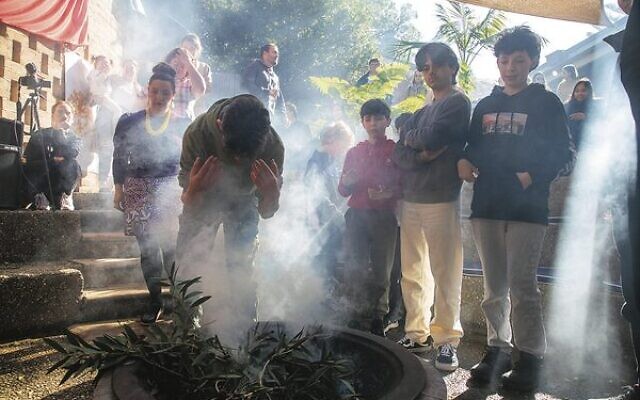Walking together in friendship
'Through my work I have come to see reconciliation as a shared journey. The destination is a dream of an Australia that is a just and equitable place for all, made possible by all our individual efforts and commitment to positive change.'
Reconciliation Week is an opportunity to reflect on what is required of us as non-Indigenous Australians to address the historical and contemporary injustices faced by First Nations peoples. We have a moral and ethical responsibility to act by listening to and learning from First Nations voices, supporting Indigenous-led efforts for positive change and finding even the smallest ways to contribute towards the overall effort of a reconciled Australia.
Jewish ethics, particularly tikkun olam and the words of Moses, “Justice, justice shall you pursue” (the repetition indicating the obligation to pursue both justice for yourself and for others) has inspired generations of Jews to engage in social justice. Our experience of antisemitism has attuned us to injustices faced by others and motivated positive action.
Examples of Jewish and Indigenous people coming together in this spirit of reciprocity, mutual respect, trust, care and learning spans decades and covers a plethora of fields. It includes, for example, the work of Ron Castan to overturn the doctrine of terra nullius in Mabo, Stand Up’s Derech Eretz program to Toomelah and Boggabilla, the Shalom Gamarada Indigenous residential scholarship program, the Rona Tranby Trust, Ghil’ad Zuckerman’s language revival work, and the deepening commitment of our schools to reconciliation.
In 2018 I participated with my son in Emanuel School’s year 6 trip to Jilkminggan, a remote community in the Northern Territory. One evening while stargazing, our guide, Tio, who has ancestral ties to the Guntijamara tribe, explained that to see the Dark Emu, one must look at the dark spaces between the stars rather than the stars themselves. As I adjusted my gaze from the pinpricks of light to the darkness between, a vision of the Dark Emu emerged. I marvelled at how without even blinking I could shift my entire paradigm. This serves as a metaphor for the way in which change can occur simply from a change in perspective.
This year’s National Reconciliation Week theme “Be a Voice for Generations” resonates with me deeply.
We can be inspired by those who have demonstrated how to show solidarity, such as Yorta Yorta man William Cooper who led a delegation of Indigenous activists to the German Consulate in Melbourne to protest the ill-treatment of Jews in Germany and Austria following Kristallnacht. His actions, at a time when Aboriginal and Torres Strait Islander peoples were not counted, reveals a man with the compassion to look beyond the problems of his people – a recognition of our common humanity. This spirit underpins reconciliation.
My personal reconciliation journey is shaped by the many conversations I have had, especially in the last few years working for Tranby Aboriginal Co-operative, Australia’s oldest Aboriginal-controlled adult education provider. For more than 65 years Tranby has been an important hub of social action.
Through my work I have come to see reconciliation as a shared journey. The destination is a dream of an Australia that is a just and equitable place for all, made possible by all our individual efforts and commitment to positive change.
We have a dark history of brutal racial violence perpetrated against Australia’s First Nations peoples. While Australia has come a long way, the journey is by no means over. The gap between Indigenous and non-Indigenous Australians is unacceptable.
For example, child mortality for Aboriginal and Torres Strait Islander peoples is almost double that of other children, out-of-home care is more than 10 times higher compared to the rest of the population, First Nations women are imprisoned at 21 times the rate of non-Indigenous women and First Nations children and young people are imprisoned at 26 times the rate of their non-Indigenous counterparts. These and other alarming statistics are evidence of entrenched generational discrimination. Solutions such as a constitutionally enshrined Voice to Parliament present us with a roadmap to the future.
How do we show up as allies in the fight against injustice? We can all be part of this journey because the work of organisations such as Tranby is strengthened by the power of allyship. As a non-Indigenous ally this involves knowing when to stand up and when to step back. Listening to and standing with, rather than talking about or talking for someone else. Respect for Indigenous people having control over the things that affect them.
Ideas that begin in, by and for community offer the best and most sustainable solutions to human rights challenges – place-based, strength-based, trauma-informed and healing focused. For far too long these community voices have been overlooked, marginalised or ignored. Finding ways to support Indigenous-led initiatives is part of a reconciliation journey for all of us.
The Uluru Statement from the Heart, for example, is an invitation for all Australians to walk together on issues of Voice, Treaty and Truth. By accepting this invitation and walking together in friendship we are a part of a story that spans generations.
Dr Lisa Miranda Sarzin is partnerships consultant at the Tranby Aboriginal Co-operative and a Rona Tranby Trust trustee, chair of Shalom Gamarada, co-author (with Dr Anne Sarzin) of Hand in Hand: Jewish and Indigenous people working together, and author of children’s book Stories for Simon.


comments